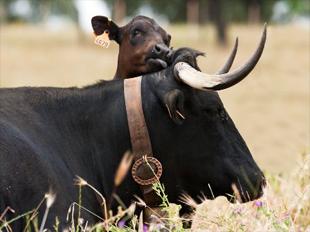
Campus Moncloa
Campus of International Excellence
Calf's gender can affect on meat quality
A joint study of the Universidad Politécnica and Complutense de Madrid within the Moncloa Campus through the Agri-Food and Health cluster has shown that the gender and the feeding system can affect on the meat quality and fatty acids of calves of Avileña-Negra Ibérica breed.
26/11/2014
A joint study of the Universidad Politécnica and Complutense de Madrid within the Moncloa Campus through the Agri-Food and Health cluster has shown that the gender and the feeding system can affect on the meat quality and fatty acids of calves of Avileña-Negra Ibérica breed.
After a series of experimental studies, a team of researchers from the Universidad Politécnica de Madrid and the Universidad Complutense de Madrid have found evidence that the gender of animals can affect on the meat quality of the Avileña-Negra Ibérica breed. Besides, meat quality could enhance through innovative feeding strategies and that does not involve an increase in production cost for farmers. All this means that consumers, in order to achieve the desired quality, can choose beef in the market according to the animal’s gender and the feeding system used during the fattening.

When they are six month old are separated from their mothers and are fed up to 500-550 kg for males and 400-450 for females. In order to assess how the feeding system affects meat quality and fat of these animals, researchers carried out three successive experiments at the experimental farm “El Dehesón del Encinar” belonging to Castilla-La Mancha and located in Oropesa (Toledo).
In the first experiment, calves were fattened in housings and fattened with cereal straw and feed as much as wanted. The derived meat of these animals had a pinkish color, an appropriate fat degree and therefore a tasty flavor. By assessing this exploitation model, we see that females synthesize more intramuscular fat than males. This result means that meat from females is more tender, juicy and flavorful. The more increase the contents of intramuscular fat in muscle, the more increase concentrations of saturated fatty acids, which are the ones undesired for cardiovascular health.
However, the result showed that an increase of intramuscular fat also leads to an increase of oleic acid concentration that, as consumers know, is good for health.
In the second experiment, calves were fattened in grazing and supplemented with 2.8 kg/day of feed composed of barley, wheat and peas. They observed this meat had a suitable intramuscular fat content and was rich in unsaturated fatty acids of the n-3 family, which is good to health, and vitamin E, which is an effective antioxidant. Meat from females had more intramuscular fat, higher content of oleic acid and lower polyunsaturated fatty acids than meat from males.
In the third experiment, two groups of calves between 400 and 520 kg were compared. One group was reared in intensive conditions with a daily consumption of 9.5 kg of feeds and 1.32 kg of cereal straw per calf while the other group was reared under free-range feeding system with a daily supplement of 4.7 kg of feed per calf. The feeding system did not affect the productivity results: carcass quality or color, but the fatty acid composition and vitamin E levels of the fat of the calves group reared in free-range feeding system were better for human health than the calves group fed in intensive conditions.
The results show that within the productive region in the Spanish Dehesa, the female fat in grazing supplemented with feed has significant financial benefits for farmers and improved meat quality for consumers.
Daza, A; Rey, AI; Lopez-Carrasco, C; Lopez-Bote, CJ. Influence of feeding system on growth performance, carcass characteristics and meat and fat quality of Avilena-Negra Iberica calves' breed. SPANISH JOURNAL OF AGRICULTURAL RESEARCH 12 (2): 409-418. DOI: 10.5424/sjar/2014122-4096. JUN 2014.
Tag: Agri-Food and Health Source: UPM
Event date:
26/11/2014
